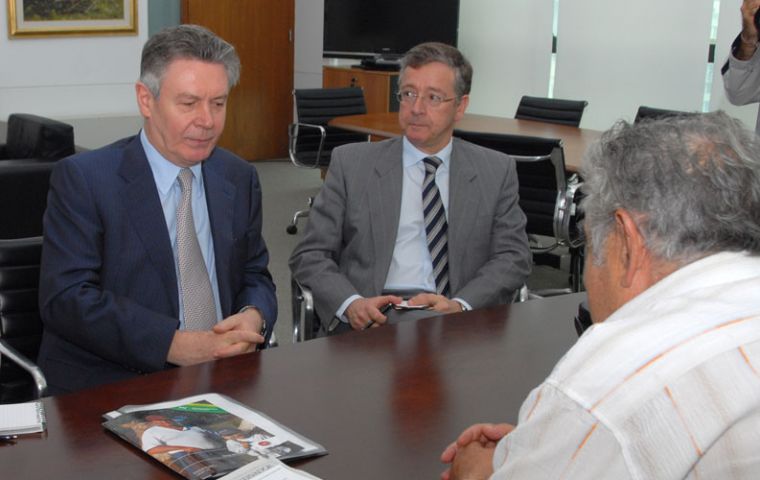MercoPress. South Atlantic News Agency
“Currencies war”, new challenge for EU/Mercosur trade agreement
 Nevertheless Karel De Gucht enthusiastic about reaching a deal with Mercosur
Nevertheless Karel De Gucht enthusiastic about reaching a deal with Mercosur The European Union Trade Commissioner Karen De Gucht anticipates a full trade agreement with Mercosur will be reached in a “short time” given the negotiations “unusual” speed but also cautioned about new challenges such as currencies over or under appreciation.
Speaking at a press conference in Montevideo following a meeting with Uruguay’s president Jose Mujica, De Gutch said he strongly believed both sides are in a position to reach an agreement, although it won’t be easy.
“The political will and moment are there; there’s a growing opinion in Europe that we must have closer links with Mercosur, work together and help speed the world economy”, underlined De Gucht who also visited Paraguay that currently holds Mercosur’s rotating chair.
Further on he said that to confront the sustained growth of the Chinese economy the two regions must join efforts since “we would then have almost 700 million consumers and a high purchasing power market, which is a good deal, if we manage to achieve it”.
Although he gave no specifics about dates for a possible agreement, De Gucht said he was “most satisfied with progress” so far and was enthusiastic “about the rhythm of negotiations, unusual for this kind of trade agreements which usually take time”.
EU/Mercosur cooperation and trade negotiations took off in 1996, but broke down in 2004 and only resumed May 2010. The discussions’ agenda includes another meeting next March in Brussels, another in May in Asuncion, Paraguay, before the June Mercosur summit “when we expect to announce significant advances in the negotiations”.
De Gucht said he was confident the agriculture issue would not be the ‘hard nut’ of the negotiations since tension will decrease as world demand increases and prices tend to climb. He added that subsides granted to European farmers should not be an impediment “because they are no longer linked to exports or production volumes”.
He added “negotiations are not affected by government changes in the region (Brazil last first January and Uruguay in March 2010)”nor the fact that Mercosur members decided to change the digital television norm from Europe to Japan (which anyhow he described as ‘a deplorable attitude’)”.
But he cautioned that the “appreciation” of currencies, particularly against the US dollar “is a new challenge and could complicate, making negotiations more difficult”.
Emerging commodities-exporting economies, such as Mercosur, are complaining bitterly that United States and China are downplaying the value of their currencies to promote their exports, and causing a massive inflow of capitals to the region forcing local currencies to strongly appreciate and threaten export competitiveness of other non-commodities sectors.
The phenomenon first coined by Brazil’s Finance Minister Guido Mantega is described as the “currencies war”.




Top Comments
Disclaimer & comment rulesCommenting for this story is now closed.
If you have a Facebook account, become a fan and comment on our Facebook Page!